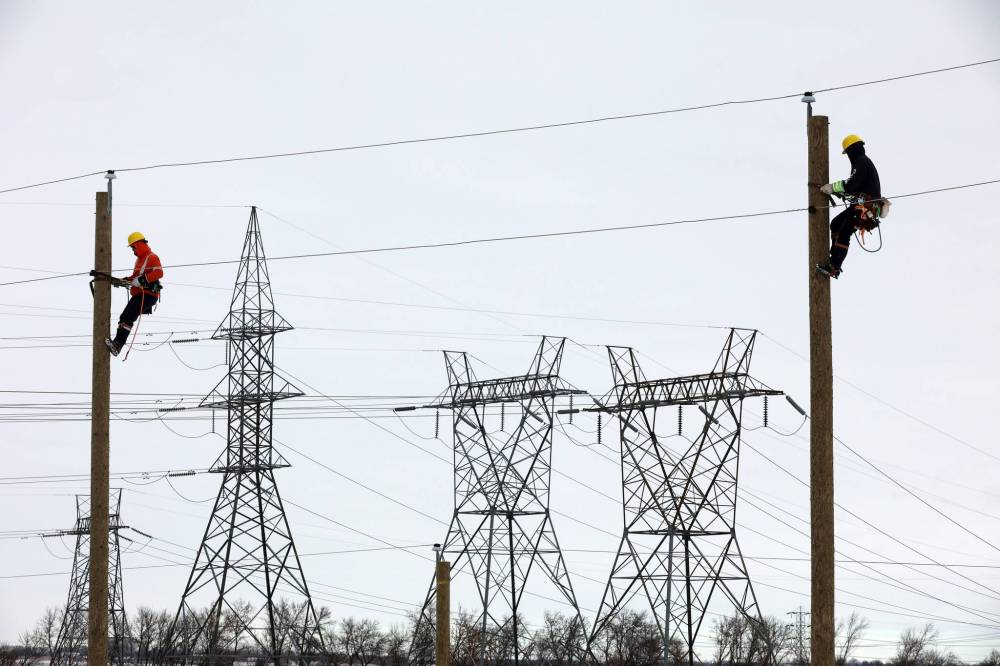A missing election issue: electricity shortfalls
Advertisement
Read this article for free:
or
Already have an account? Log in here »
To continue reading, please subscribe:
Monthly Digital Subscription
$1 per week for 24 weeks*
- Enjoy unlimited reading on winnipegfreepress.com
- Read the E-Edition, our digital replica newspaper
- Access News Break, our award-winning app
- Play interactive puzzles
*Billed as $4.00 plus GST every four weeks. After 24 weeks, price increases to the regular rate of $19.95 plus GST every four weeks. Offer available to new and qualified returning subscribers only. Cancel any time.
Monthly Digital Subscription
$4.99/week*
- Enjoy unlimited reading on winnipegfreepress.com
- Read the E-Edition, our digital replica newspaper
- Access News Break, our award-winning app
- Play interactive puzzles
*Billed as $19.95 plus GST every four weeks. Cancel any time.
To continue reading, please subscribe:
Add Free Press access to your Brandon Sun subscription for only an additional
$1 for the first 4 weeks*
*Your next subscription payment will increase by $1.00 and you will be charged $16.99 plus GST for four weeks. After four weeks, your payment will increase to $23.99 plus GST every four weeks.
Read unlimited articles for free today:
or
Already have an account? Log in here »
Hey there, time traveller!
This article was published 03/10/2023 (884 days ago), so information in it may no longer be current.
It’s an issue that poses a grave threat to Manitoba’s economy, yet it has received no attention from any of the parties and their respective leaders during the provincial election campaign that concludes today.
On July 28, the Stefanson government issued a media release that said “The Manitoba government has launched a new clean energy roadmap that will deliver on a commitment to ensure a secure supply of affordable, reliable, and sustainable power for people and businesses today and into the future.”
That sounded innocuous, but the bottom of that release contained several links to other documents. One of those links was to a Powerpoint presentation entitled Manitoba’s Energy Roadmap.

Tim Smith / The Brandon Sun files
Manitoba Hydro’s ability to supply electricity in the future should have been an election issue. It wasn’t.
That document revealed that “Manitoba currently has an installed generating capacity of 6,600 MW” and “by the early 2040s growing demand for electricity in MB could require 10,000 MW to 16,000 MW of generating capacity.” It also revealed that there are currently “4,400 MW in new requests from 18 energy-intensive industrial projects.”
In other words, Manitoba doesn’t have enough generating capacity to meet the increased demand for electricity that is expected to occur over the next several years, let alone provide power for new projects.
Despite the troubling implications of that information, nothing more was heard on the issue until last Friday, when a CBC report revealed that a confidential Manitoba Hydro briefing note dated Sept. 13 states that Hydro’s “near-term surplus electricity supply” is so small that even “a single energy-intensive connection may consume all remaining electrical capacity.”
According to the CBC report, the note discloses that there are currently 57 proposals that would require large volumes of electricity. The memo warns, however, that “Manitoba Hydro is unable to offer firm commitments to prospective customers that may align with Manitoba’s energy roadmap and/or provincial economic development objectives… As such, Manitoba Hydro cannot reserve electric supply for particular projects.”
Take a moment to let that sink in. Those words obliterate the long-repeated claim that Manitoba’s ability to attract large businesses with our ample supply of clean, green and affordable electricity ensures our path to sustained prosperity. Without that ample supply, we don’t get the long-term prosperity.
The fact that Manitoba is on the threshold of a homegrown energy crisis — unable to meet our own requirements for electricity and unable to provide electricity for large businesses wanting to locate here — should have set off alarm bells throughout the province in July. Plans to address the problem should have been the basis for campaign commitments from the various political parties, and pointed questions at every debate. Inexplicably, that did not happen.
The Energy Roadmap says that Hydro must massively increase its generating capacity in order to meet industrial and consumer demand for green electricity, yet none of our political parties have explained to Manitobans how that will be done, how much it might cost, whether those investments would be privately- or publicly-funded, nor what the impact will be on hydro rates.
Even worse, none of the parties have addressed the fact that it will take years to build sufficient generating and transmission capacity to satisfy the expected demand, nor that we may be unable to meet our own electricity requirements before that happens.
If our politicians think we can avoid electricity shortages by importing surplus power from other jurisdictions, they are deceiving themselves. Every jurisdiction across the continent will be scrambling to address electricity shortfalls and transmission capacity issues at the same time. There will be no surplus electricity available for purchase.
Could that result in limits on usage, surge pricing or even potential rotating blackouts here in Manitoba? Nobody knows, because none of the parties addressed the issue in their respective platforms.
What we do know, however, is that this issue should have been fully discussed during the election campaign. If that had happened, we may have arrived at a consensus as to the correct approach, and the new government could claim a public mandate to address the problem.
In the absence of that public discussion, there is no consensus on how to solve the problem, and the next government will not have a clear mandate on how to proceed. We will be handing them a blank cheque and hoping for the best.
Given past governments’ history of mismanagement of Manitoba Hydro capital projects, that should not inspire confidence.
Deveryn Ross is a political commentator living in Brandon. deverynrossletters@gmail.com X: @deverynross














